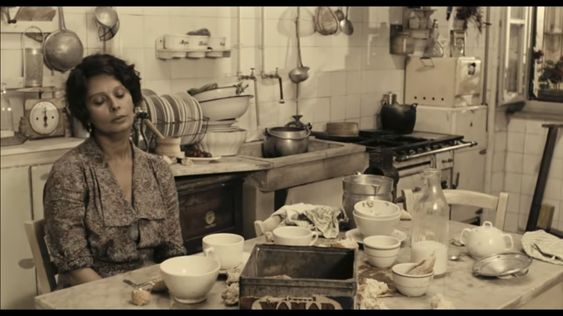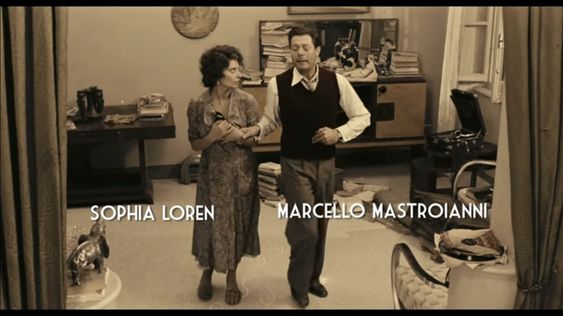A Special Day: Love and Life under Fascism

Early in the morning of the special day, the noise and bustle of families getting ready echo through the open windows of the building. Quickly, Antonietta pours the coffee already waiting on the stove, brings the filled cup to the table—between the uniforms she had just ironed—to add some sugar. Now with cup, saucer, and teaspoon in her left hand and uniforms draping on the arm, she walks to each bed to wake the kids one by one. While taking small sips of coffee from the spoon, she hands each child their uniform. Finally reaching the last bed—the sixth and biggest—she wakes her husband and hands him the coffee. The rounds are not over yet. Next to Papa, buried under the covers, is their youngest!
This is the special day, all of Rome are getting ready for the parade. Not Antonietta, however, even though she is a big supporter of Il Duce. Her wifely duties do not allow her the luxury to spend a whole day out of the house, unlike women who have domestic helpers. Antonietta will miss the historical moment Il Duce welcomes German fascist leader, Adolf Hitler, on his seven-day visit to Italy.
Hitler’s visit to Italy on May 3rd, 1938 was a significant moment in the history of fascism. Despite the fanfare, Mussolini or Il Duce, as he was called, did not agree to a military alliance with Germany. Nonetheless, after this visit, Mussolini began introducing laws which marginalized Italy’s Jewish people.
Having stayed home, on that special day Antonietta experienced a life changing moment. Whilst trying to catch her escaped bird, it was when she by chance met her neighbor, Gabriele, who lived across her apartment building. The bird had flown near Gabriele’s window while he was at his desk, contemplating suicide. After an exchange of visits on that day, she learned that Gabriele was a radio broadcaster who was fired and will be deported to Sardinia. His crime: being gay. Unlikely as it may seem, the two instantly connected. They both learned of each other’s life and their different views of the government, and as the story unfolds, the odd couple fell in love.
This is the storyline of the critically acclaimed Italian film A Special Day, directed by Ettore Scola and produced by Carlo Ponti. Released in May 1977, starring Sophia Loren and Marcello Mastroianni, the film received many awards, including the César Award, Golden Globe Film, and Nastro d'Argento, in addition to two Academy Award nominations. Interestingly, Mussolini’s granddaughter, Alessandra Mussolini was cast in the film.

Through the events of one day, the film gives a daunting picture of life under fascism. The omnipresence of the ruler in daily life is interwoven into the narrative and through the background sound of the parade taking place.
The story revolves around Antonietta (Sophia Loren), a low-educated, lower middle-class housewife. She is the image of the ideal Italian woman under fascism—an admirer of Il Duce, a devoted housewife and mother; a devotion extended to the state. “I have six children”, Antonietta said as she introduced herself to Gabriele (Marcello Mastroianni). “By the seventh, they will give you a bonus.”
The government gave prizes and compensations to encourage women to bear many children with the aim of increasing the Italian population and army reserve. Single men, like Gabriele, in contrast, were taxed.
Antonietta’s husband (John Vernon) is the typical Italian fascist male of the time—the breadwinner and savior who treats his wife like an inferior being and has affairs with other women. Nevertheless, like the beloved Italian woman of the time, her family and the kitchen are the center of Antonietta’s life. From the kitchen table she would gaze out the window while pouring the remains from other cups into her cup—never really having her own cup (or life), except during Gabriele’s visit. Il Duce is present in family life through his picture that overlooks the kitchen. How the occupants are able to see each other through the windows is an extension of state surveillance.
“You forgot to take this,” said Gabriele, who suddenly appeared at Antonietta’s door, holding The Three Musketeers, the book which he had recommended earlier to Antonietta. He ended up coming inside and grinding coffee beans (and spilling some on the floor) for the cup of coffee Antonietta had offered. Then came a knock on the door. The caretaker (Françoise Berd) had come to warn Antonietta about Gabriele, who she knew was visiting Antonietta.
However, Antonietta was smitten by Gabriele, a liberal, antifascist, and gay radio broadcaster on the verge of suicide.
However, Antonietta was smitten by Gabriele, a liberal, antifascist, and gay radio broadcaster on the verge of suicide. How they made love, considering Gabriele’s sexual orientation, is open to interpretation—except for the conclusion that Antonietta had changed him. In fact, it was Antonietta who was changed by this encounter as she now sees fascism in a different light.
The film, however, did not fully capture the public life of Italian women under fascism. Although confined to domesticity, thousands to millions of women were enrolled in government-created women’s organizations.
In line with the state’s gender ideology, many women’s organizations focus on maternal health issues and care for newborns. However, these organizations were not merely a campaign to mobilize female supporters. They served an important purpose in reducing Italy’s high infant mortality rate, which was at 106.2 deaths for every 1,000 lives in 1938—the highest in Europe. Mussolini believed that a rapid increase in the Italian population could be achieved by banning contraception, illegalizing abortion, and establishing mass women’s organizations, where women worked to assist other women to improve hygiene, health, and nutrition.
From this view, fascist policies which excluded women did not completely isolate women from society.
From this view, fascist policies which excluded women did not completely isolate women from society. Women, in fact, had an important social role within the fascist framework, whilst any role was absent in the previous liberal state. Although these organizations controlled and limited women’s role as reproductive machines, in their own way, they empowered women. It was the first time any assistance of the kind, which improved women’s knowledge and skills about health and maternity, included women of all levels of the society. Nevertheless, the effectiveness of these organizations is debatable and despite a nationwide propaganda to promote the nobleness of motherhood, the population did not significantly increase and many women continued to work because of necessity.
All in all, A Special Day depicts how fascism penetrated into the private sphere, controlled and oppressed the individual, as reflected in the lives of Antonietta and Gabriele. She was treated as the chattel in the battle for population; he, the male degenerate.
In the evening of the special day, the authorities came for Gabriele. While gathering his things, he accidentally found a few coffee beans in the pocket of his suit. Slightly bewildered, he took a quick glance across the window. Minutes later, from her window, Antonietta watched as Gabriele leaves in the night escorted by two men. She was reading aloud the first few pages of The Three Musketeers—the political tale he left her with.
-Some Thoughts from the Cappuccino Girl- (2023)
#films #cinema #Italy #fascism #history #gender #worldwar2
Read about modern political strongmen: Political Strongmen and the Crisis of Democracy
If you are interested in how population polices affect women, read: Only Women Breed: Population Policies and Gender
Images: Cult Film trailers: https://youtu.be/KloWrqcHAF0
Sources:
Cavendish, Richard (2008) ‘Hitler and Mussolini Meet in Rome.’ Historytoday https://www.historytoday.com/archive/hitler-and-mussolini-meet-rome (Accessed 22 January 2023).
Monti, Jennifer Linda (2011) The Contrasting Image of Italian Women under Fascism in the 1930’s. Syracuse University Honors Program Capstone Projects. 714. https://surface.syr.edu/cgi/viewcontent.cgi?article=1706&context=honors_capstone (Accessed 26 December 2022).
POPULAR TOPICS
#subculture
Gurlesque: Poetics of the Bizarre, Ugly, and Feminine
#films
Mrs. Robinson, Countercultures, and Politics
#history
The Dutch Golden Age, Golden for Whom?
I also write articles here: https://feministpassion.blogspot.com/